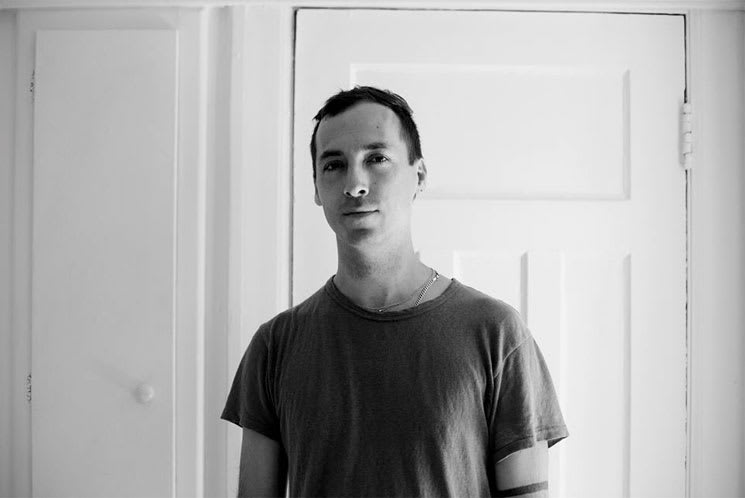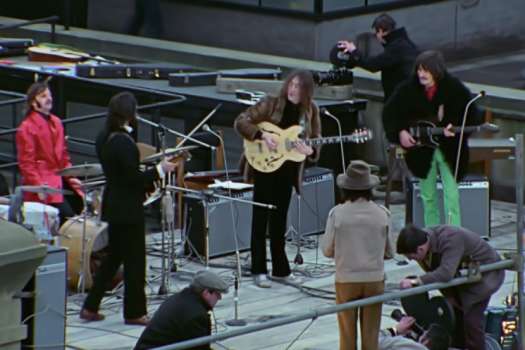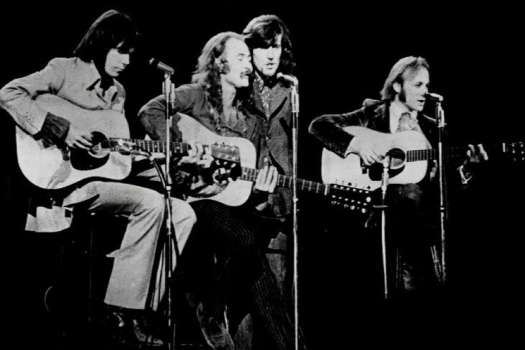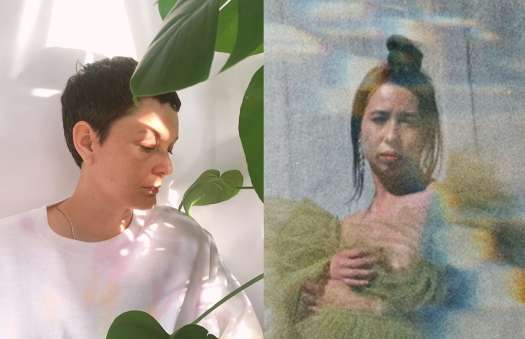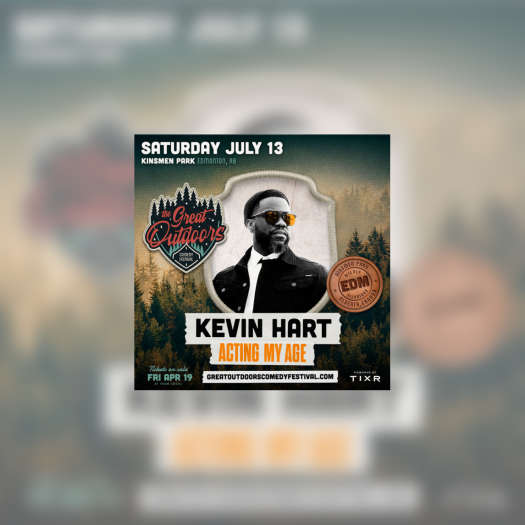Presented as part of a Vancouver New Music concert series, artistic director Giorgio Magnanensi brought Montreal's Tim Hecker out before his set to engage in an artist talk. Hecker said that he had never done one of these before, generally doesn't like talking and later admitted that he was fighting off a burger coma, but he was candid and humorous as he attempted to summarize his creative process at the end of his current album cycle, and responded to a few queries from the crowd.
The audience latched on to his musing about how he avoids listening to experimental music in his spare time for fear of creative inhibition and how he puts on a "veil of ignorance" so that he can express himself in an authentic way, so much of the questions asked of him followed in that line, goading him to say specifically which rap artists he'd been listening to or gain further insight into how he avoids being too referential. Hecker stuck to his guns, though, giving more credit to visual artists rather than musicians as direct influences in his endeavours.
Sometime after the talk had ended, the lights dimmed, and Hecker approached his station in the middle of the shoebox theatre space, which was ringed with black curtains. Opposite two rows of chairs and a rise of theatre seats, a folding table draped with black cloth held a small Korg keyboard, Allen & Heath mixer, Evolutions U-Control MIDI controller, Komplete Audio-6 interface, laptop and few other small bits — a couple of monitors, amps, and subs staggered on the floor behind it joining the house system somewhere in the rafters.
The pieces he presented recomposed Gregorian chants and 15th century sacred voice music for synthesizer, computer and guitar amplifiers, a sculptural starting point for a kind of post-Yeezus liturgical music, doing the Arvo Pärt-esque sacred after the juggernaut of destruction that is Auto-Tune.
For the logical reasoning that most people stare at screens all day anyway, Hecker avoided all visual stimulation, so there were no stage lights, fog or anything of that nature — the stairs were illuminated brighter than he was. As such, it was difficult to tell exactly what he was doing with his minimal set-up, but in effect, it made it easier for listeners to simply close their eyes and drift away into the waves of abstract expressionist noise he created, fragments of steel drum melody, percussive strings, oboe and flute-like timbres rising out of the meditative textures with its layers of lower frequencies that rarely coalesced into tangible rhythms.
Hecker likes to ride the line between pleasurable tonality, with joyful vibrations, and ones that make you worried about your bowels. Although earplugs were made available for free at the door, he noted that he would not attempt to create a Marquis de Sade chamber of pleasure and pain in the space — he wouldn't subject people in a seated environment to that because he doesn't want to hurt people. Yet, he still produced vignettes of gut-rumbling bass, a physical effect that further enhanced the music's meditative qualities, an internal massage on all fronts.
Hecker's live presentation evokes a definite physical and mental response in listeners — it struck deep. It was academically complex and continually evolving, yet cosmically entrancing and spiritually transcendent. It was an experience in a pure space, an escape from the daily grind.
As the sounds faded out into nothingness after an hour of constant expression, and the lights crept back on, Hecker put his hands into a prayer and bowed with humble gratitude.
The audience latched on to his musing about how he avoids listening to experimental music in his spare time for fear of creative inhibition and how he puts on a "veil of ignorance" so that he can express himself in an authentic way, so much of the questions asked of him followed in that line, goading him to say specifically which rap artists he'd been listening to or gain further insight into how he avoids being too referential. Hecker stuck to his guns, though, giving more credit to visual artists rather than musicians as direct influences in his endeavours.
Sometime after the talk had ended, the lights dimmed, and Hecker approached his station in the middle of the shoebox theatre space, which was ringed with black curtains. Opposite two rows of chairs and a rise of theatre seats, a folding table draped with black cloth held a small Korg keyboard, Allen & Heath mixer, Evolutions U-Control MIDI controller, Komplete Audio-6 interface, laptop and few other small bits — a couple of monitors, amps, and subs staggered on the floor behind it joining the house system somewhere in the rafters.
The pieces he presented recomposed Gregorian chants and 15th century sacred voice music for synthesizer, computer and guitar amplifiers, a sculptural starting point for a kind of post-Yeezus liturgical music, doing the Arvo Pärt-esque sacred after the juggernaut of destruction that is Auto-Tune.
For the logical reasoning that most people stare at screens all day anyway, Hecker avoided all visual stimulation, so there were no stage lights, fog or anything of that nature — the stairs were illuminated brighter than he was. As such, it was difficult to tell exactly what he was doing with his minimal set-up, but in effect, it made it easier for listeners to simply close their eyes and drift away into the waves of abstract expressionist noise he created, fragments of steel drum melody, percussive strings, oboe and flute-like timbres rising out of the meditative textures with its layers of lower frequencies that rarely coalesced into tangible rhythms.
Hecker likes to ride the line between pleasurable tonality, with joyful vibrations, and ones that make you worried about your bowels. Although earplugs were made available for free at the door, he noted that he would not attempt to create a Marquis de Sade chamber of pleasure and pain in the space — he wouldn't subject people in a seated environment to that because he doesn't want to hurt people. Yet, he still produced vignettes of gut-rumbling bass, a physical effect that further enhanced the music's meditative qualities, an internal massage on all fronts.
Hecker's live presentation evokes a definite physical and mental response in listeners — it struck deep. It was academically complex and continually evolving, yet cosmically entrancing and spiritually transcendent. It was an experience in a pure space, an escape from the daily grind.
As the sounds faded out into nothingness after an hour of constant expression, and the lights crept back on, Hecker put his hands into a prayer and bowed with humble gratitude.
